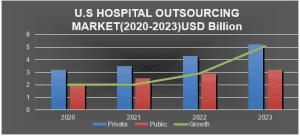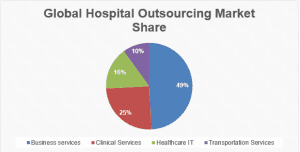On-Demand Outsourcing BPO Services for Healthcare Providers With 24/7 Coverage!
Save up to 70% on staffing costs!
Browse Specialty Staffing ServicesMedical Outsourcing – A step toward Global Evolution in Advancement

Author: Wasif Rana, St. Pauls College of Pharmacy
ABSTRACT:
The demand for international healthcare services is rising dramatically. In order to lower their healthcare costs, US patients are looking for internationally competitive healthcare. We contend that factors such as economic situations, political environments, and regulatory frameworks all affect the choice of country. Companies today can outsource a number of tasks or services. Companies can outsource entire divisions, such as its entire IT department, or just parts of a particular department.
Pharmacy industry is a no less to outsourcing of manpower, skills and services. Companies often outsource as a way to lower costs, having efficacy of work and gain speed. Companies that decide to outsource rely on the third-party providers’ expertise in performing the outsourced tasks to gain such benefits. The underlying principle is that because the third-party provider focuses on that particular task, it is able to do it better, faster and cheaper than the hiring company could.
Healthcare Industry and Outsourcing:
Hospitals and other healthcare facilities around the world have outsourced a variety of ancillary tasks. Hospitals can concentrate on providing effective healthcare services because of outsourcing. By cutting administrative expenses while raising revenues, improving efficiency, and providing better service, outsourcing auxiliary tasks can enhance financial outcomes. The majority of supplementary operations in hospitals require specialized knowledge or significant infrastructure. The market for healthcare outsourcing is being driven by an increase in hospitals, clinics, research facilities, pharmaceutical/clinical laboratories, as well as a notable expansion of the pharmaceutical sector. Payer outsourcing, provider outsourcing, pharmaceutical outsourcing, pathology and laboratory outsourcing are all services that are provided by different manufacturers under the healthcare/medical outsourcing category1.
Healthcare providers are ultimately receiving less advantage for their amenities and are being put under more pressure from patients to continue providing top-notch care as a result of the rapidly rising cost of healthcare services and the cost of government healthcare Programmes has moved to healthcare sources. Healthcare service providers are seeking for ways to outsource in order to counteract these rising costs as a result. Pharmaceutical is predicted to dominate the global healthcare outsourcing market by services and will account for over 65% of the market’s overall revenue in 2021, according to estimates. Payer, however, is anticipated to rise at the fastest rate during the projection period2.
The emergence of numerous new multi-specialty hospital chains has increased the need for outsourcing. In addition, hospitals have begun to use outside services for imaging interpretation and transcription of doctor’s case notes, which is expected to spur a growth in the healthcare outsourcing sector. A growing number of service providers, such as payers, healthcare operations, healthcare providers, pharma outsourcing, pathology & lab outsourcing, and many more, are fueling the growth of the healthcare outsourcing industry. The market demand for healthcare outsourcing is examined in the report with regard to different geographic areas. The top five healthcare outsourcing markets’ competitive landscape is examined, and market participants are profiled and analyzed on a variety of different criteria, including company background, financial overview, product portfolio, and recent advancements3.
The pre-story of healthcare job, title and description:
From 2021 to 2031, it is anticipated that an overall employment in the healthcare sector would increase by 13%, a rate that is significantly greater than the average for all occupations and will add almost 2 million jobs to the list. Opportunities come from the need to replace people who permanently leave their occupations, in addition to new positions created by expansion. It is studied that growth and replacement requirements will result in around 1.9 million openings annually.
Healthcare support occupations (such as home health and personal care aides, occupational therapy assistants, and medical transcriptionists) had a median annual wage of $29,880 in May 2021, which was lower than the median annual wage for all occupations of $45,760. Healthcare practitioners and technical occupations (such as registered nurses, doctors and surgeons, and dental hygienists) had a median annual wage of $75,040 in May 2021, which was higher than the median annual wage for all occupations4.
Healthcare Outsourcing Market:
Hospital Market:The size of the worldwide outsourcing market for hospitals was estimated at USD 270.9 billion in 2019 and is estimated to increase at a CAGR- (Compound Annual growth Rate) of 6.8% from 2020 to 2023. Hospitals are increasingly contracting out internal tasks to outside service companies, including IT and medical billing. Due to the lack of knowledge and the scarcity of qualified employees in the sector, hospitals are mostly outsourcing medical billing and IT services to third-party service providers. Furthermore, these service providers are held responsible for their quality standards as a result of the implementation of laws and accreditation for them.

Figure 1: U.S Hospital Market17.
In addition, private hospitals biggest problem in the sector includes lack of internal knowledge, skills, and resources. Due to their affordable service offerings, contract hospital service provides an efficient way to limit these problems in private hospitals. It facilitated the development of cooperative connections between hospitals and outside service providers.
The main drivers of the market throughout the forecast period also include complexity and a lack of experience in revenue cycle management, payroll processing, central supply management, and home care services. Over the course of the forecast period, expansion in the hospital outsourcing market is anticipated to be constrained by expanding data security concerns, as well as linguistic and cultural obstacles.
Due to the federal requirement to deploy Electronic Medical Records (EMR), rising healthcare expenses, and the implementation of complicated ICD-10 coding systems, the hospital business is currently seeing an increase in the outsourcing of internal services. The market is anticipated to develop as a result of an increase in patient volume and the growing burden of medical procedures, such as determining insurance eligibility and keeping track of patient check-ins5.

Figure 2: Global Hospital Outsourcing Market17.
- The Role of Artificial Intelligence in Healthcare :
Artificial Intelligence plays an important role administrative tasks including managing or analyzing medical record-keeping, processing insurance claims, and other secretarial tasks aside from front-line clinical work. In order to provide early warning or predictive diagnosis of various ailments, it can also be utilized to evaluate data obtained from patient variables or in-home sensors used in virtual medical environments. All of these examples suggest that AI will play a significant trend in healthcare over the course in the near future6.
- Healthcare BPO- Backend Processing office Market:
By 2026, it is made sure that the size of the worldwide healthcare BPO market will be of USD 468.5 billion, expanding at a CAGR of 9.6%. The pharmaceutical and life sciences industries are increasing outsourcing, the need to rein in healthcare spending, the rise in demand for specialized services like fraud detection and care management, among others, and the need for organized procedures and documentation in the healthcare sector are all factors contributing to the market growth. However, some of the key elements anticipated to impede market expansion are worries about data security and privacy as well as the worry of losing visibility and control over company processes7.
- Medical Billing:
Medical billing outsourcing offers a variety of benefits to busy medical practices, including fewer billing errors, more time for providing high-quality patient care, less money spent on internal training, and improved revenue flow through the filing of error-free medical claims. The global medical billing outsourcing market, which was valued at USD 6982 million in 2017, is predicted to expand at a roughly 12.5% CAGR from 2018 to 2023, according to a report from Market Research Future8.
Global Healthcare Outsourcing Market Segmentation By Types, By Applications and By Region:
The global healthcare outsourcing market is analyzed, and regional market data is supplied (countries). The Healthcare Outsourcing market is divided into the following regions: the United States, Europe, China, Japan, Southeast Asia, India, and the Rest of the World. The market size for each region for the years 2017 to 2027 is included in the report. Additionally, it contains a market size and projection for sales and revenue for the years 2017 to 2027 by players, type, and application segment9.
The global fact checks
Healthcare Outsourcing Market Segment by Region:
Why the U.S. Healthcare Regulatory Affairs Outsourcing Market is Witnessing High Demand?
Because there are numerous small and major pharmaceutical and biotechnology companies in the U.S. as well as a strong healthcare industry, the country is anticipated to become a lucrative market. Sales in the North American market are anticipated to hold 30% of the overall market share in 2022, according to FMI. To reduce potential hazards and expedite the licensing process, regulatory authorities’ strict compliance requirements are encouraging collaborations between drug developers, clinical research organizations (CROs), and contract manufacturing organizations (CMOs)10.
Additionally, a number of generic medications are approaching their expiration dates, which is anticipated to increase market sales. In the upcoming years, increased research and development in the U.S. for novel medications, vaccines, and medical devices will continue to support market expansion10.
Why is the China Healthcare Regulatory Affairs Outsourcing Market Considered Attractive?
It is anticipated that favorable government policies and investments in China’s healthcare sector expansion will make it an appealing niche in the Asia Pacific market. In 2022, demand is anticipated to account for 27.4% of the global market share 11.
Consolidation in the generic medication market is encouraged by lower prices. However, businesses are increasingly concentrating on international growth, which is increasing demand for outsourcing services in order to improve compliance and hasten drug approvals12.
India Healthcare Regulatory Affairs Outsourcing Market: Driven by favorable Government Policies
The government has been putting into effect a number of programs that are predicted to accelerate market expansion. People from all facets of society are anticipated to be covered under the Universal Health Insurance Scheme, for instance. Regarding the Indian health tech market, it is anticipated that by 2025, it would have reached a worth of US$ 8 billion and will expand at a CAGR of around 40%. (13) Even international businesses have begun to enter the Indian market through FDI. The industry for medical and surgical appliances reported a tremendous 202% increase in FDI infusion during the years 2021–2022. In addition, the rising disposable income would enable the end consumers to utilize this service to its fullest. The market for outsourcing healthcare regulatory issues is anticipated to increase significantly as a result13.
Global Healthcare IT Outsourcing Market:
According to Transparency Market Research’s most recent analysis, the worldwide healthcare IT outsourcing market is anticipated to reach $61.2 billion by 202314.
The desire for healthcare providers to raise patient happiness, boost efficiency, and save costs is driving demand for healthcare IT outsourcing services14.
Due to a growing emphasis on asset management, billing, operations management, and healthcare data management, the IT administration market is anticipated to take the lead and reach $21.5 billion by 2023. Due to rising standards for high-quality healthcare services and a growing patient base, vendors may potentially find demand in the care management sector 15.
In terms of regional market share, healthcare IT outsourcing is anticipated to reach $21.2 billion in North America. According to the survey, in order to increase their market shares in the Middle East, Africa, and Asia-Pacific, larger companies will form tactical alliances with regional businesses.
According to the report, as healthcare IT outsourcing firms build their own analytical platforms, they will concentrate on providing high-quality patient care and patient data management systems. Additionally, this might enable them to supply payers and healthcare providers with specialized solutions.
In spite of their growing dissatisfaction with their IT outsourcing experiences, healthcare providers continued to outsource, according to a 2017 Black Book Research Survey.
The majority of respondents claimed that their IT managers’ lack of experience prevented them from efficiently managing their outsourced solutions.
Only seven out of 68 EHR vendors received a “exceeds expectations” rating, placing Cerner as the top EHR among complicated outsourcing solutions.
The reason that slightly more than one-tenth of respondents did not outsource was that they preferred to keep their data in-house so that they could maintain greater control over their applications.
Around 81 percent claimed that their outsourcing partner could be kept because of the return on investment, while 73 percent cited availability to qualified personnel and necessary technology as their main justifications.
There is competition for administrators and developers because there aren’t many people with the necessary experience. Additionally, healthcare firms are trying to reduce their IT costs since they can’t afford to bid against other businesses for full-time employees.
Typically, contracts last between three and five years. There is a bid process for the following contract when the current contracts expire. This may lead to the same contracted employees being renewed or new employees taking their place.
In general, healthcare IT outsourcing can be a useful strategy that enables businesses to obtain the best healthcare IT knowledge at a reasonable price16.
“Outsourcing and globalization of manufacturing allows companies to reduce costs, benefits consumers with low cost goods and services, causes economic expansions that reduces unemployment, and increases productivity and job creation”
“Larry Elder”
Conclusion: From the above information we can clearly draw the conclusion that the current healthcare department needs an emergency shift in bringing out more innovative outsourcing strategies for updation and upgradation. It is the need of the hours to address the shifts, problems, challenges of medical outsourcing to make the world of health.
After all “ Health is well”
References:
- Jawab, F., Frichi, Y. and Boutahari, S., 2018, March. Hospital logistics activities. In Proceedings of the International Conference on Industrial Engineering and Operations Management (pp. 3228-3237).
- Clark Jr, Thomas D., Robert W. Zmud, and Gordon E. McCray. “The outsourcing of information services: transforming the nature of business in the information industry.” Journal of Information Technology 10, no. 4 (1995): 221-237.
- Cavalli, Enrico, Andrea Mattasoglio, Francesco Pinciroli, and Piergiorgio Spaggiari. “Information security concepts and practices: the case of a provincial multi-specialty hospital.” International Journal of Medical Informatics 73, no. 3 (2004): 297-303.
- Lockard, C.B. and Wolf, M., 2012. Occupational employment projections to 2020. Monthly Lab. Rev., 135, p.84.
- Liu, X., Hotchkiss, D.R. and Bose, S., 2008. The effectiveness of contracting-out primary health care services in developing countries: a review of the evidence. Health policy and planning, 23(1), pp.1-13.
- Bini, Stefano A. “Artificial intelligence, machine learning, deep learning, and cognitive computing: what do these terms mean and how will they impact health care?.” The Journal of arthroplasty 33, no. 8 (2018): 2358-2361.
- Pollitz, K., Tolbert, J. and Ma, R., 2014. Survey of health insurance marketplace assister programs. Kaiser Family Foundation, 15.
- Faux, M., Adams, J. and Wardle, J., 2021. Educational needs of medical practitioners about medical billing: a scoping review of the literature. Human Resources for Health, 19(1), pp.1-9.
- Smith, Pamela C., and Dana A. Forgione. “Global outsourcing of healthcare: a medical tourism decision model.” Journal of Information Technology Case and Application Research 9, no. 3 (2007): 19-30.
- Busfield, J. (2003). Globalization and the pharmaceutical industry revisited. International Journal of Health Services, 33(3), 581-605.
- Frew, S.E., Kettler, H.E. and Singer, P.A., 2008. The Indian and Chinese health biotechnology industries: potential champions of global health? Health Affairs, 27(4), pp.1029-1041.
- World Health Organization. (2017). China policies to promote local production of pharmaceutical products and protect public health.
- Sarwal R, Prasad U, Gopal KM, Kalal S, Kaur D, Kumar A, Regy PV, Sharma J. Investment Opportunities in India’s Healthcare Sector.
- Al-Ekabi, C., 2017. European Space Activities in the Global Context. In Yearbook on Space Policy 2015 (pp. 3-100). Springer, Vienna.
- Jack, Eric P., and Thomas L. Powers. “A review and synthesis of demand management, capacity management and performance in health‐care services.” International Journal of Management Reviews 11, no. 2 (2009): 149-174.
- Warner, Michael, and Rory Sullivan, eds. Putting partnerships to work: Strategic alliances for development between government, the private sector and civil society. Routledge, 2017.
- Berry, Leonard L., Sunjay Letchuman, Nandini Ramani, and Paul Barach. “The High Stakes of Outsourcing in Health Care.” In Mayo Clinic Proceedings, vol. 96, no. 11, pp. 2879-2890. Elsevier, 2021.
 Book a Demo to Build Your Team Today!
Book a Demo to Build Your Team Today!
 Read Case Studies
Read Case Studies 



 Virtual Medical Assistants
Virtual Medical Assistants



